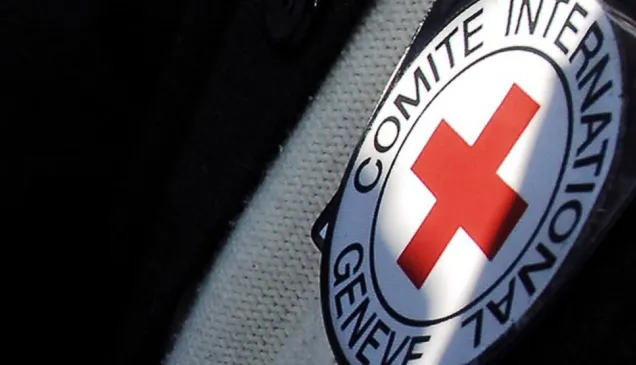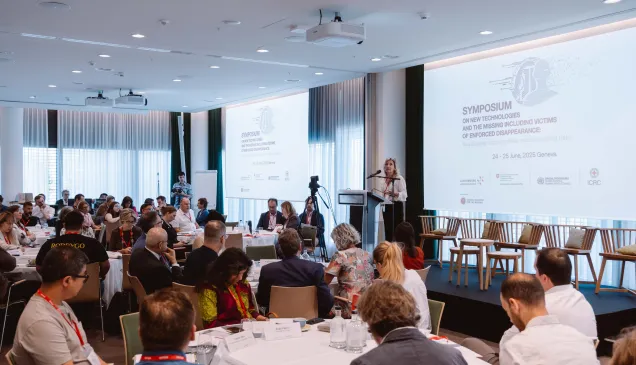Corporate Support Group visits Syrian refugees in Jordan
In the first visit of its kind, the ICRC recently took eight members of its Corporate Support Group (CSG) to Jordan, so they could see the situation on the ground for themselves and discover how the ICRC is helping people who have fled the fighting in Syria.
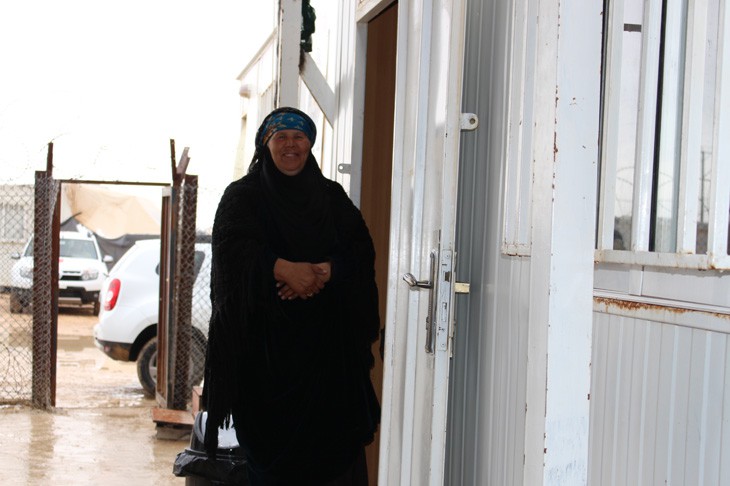
Zaatari refugee camp, Jordan. A Syrian refugee leaves the ICRC office after making a phone call to relatives in Syria.
The visit had two aims: to give the participants a first-hand view of the geopolitical and humanitarian crises in the Middle East, with a special focus on Syria and Syrian refugees, and to give them a better understanding of how the ICRC helps people affected by conflict.
Visits to logistics centre and refugee camps
The trip started at the ICRC delegation in Amman with briefings and discussions led by the president of the ICRC, the head of operations for the Middle East and the head of the ICRC delegation in Jordan.

Amman, Jordan. CSG members visit the ICRC's Amman warehouse, guided by the president of the ICRC and the ICRC team in Jordan. This is the largest ICRC warehouse in the world, supporting operations in the Middle East and beyond.
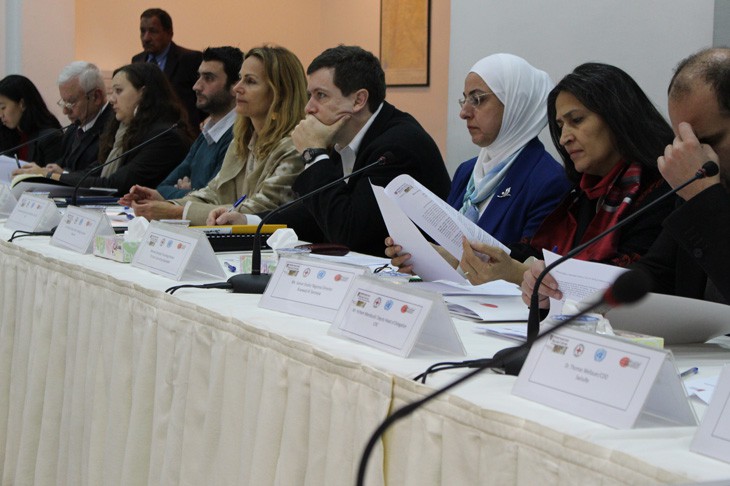
Jordanian Institute of Diplomacy, Amman, Jordan. Discussion on the roles of the private sector, neighbouring States and the international community in helping the refugees.
It continued with a lunch with the Swiss ambassador to Jordan and Iraq, a visit to the biggest ICRC logistics centre in the world, located on the outskirts of Amman, and discussions on the Syrian refugee crisis at the Jordanian Institute of Diplomacy, with the Jordanian business community, UN representatives and students from Harvard University.
The first day was also an opportunity for the ICRC and the Fondation Lombard Odier to sign a four-year plan of action for developing innovation at the ICRC, focusing on three areas: testing innovative pilot projects in the field, unleashing innovation within the ICRC and harnessing the support of the corporate sector and other partners. This will include supporting the Global Partnerships for Humanitarian Impact and Innovation (GPHI2).
The visitors spent the second and third days in the field, visiting ICRC teams in Ruweyshid, Mafraq and at Zaatari refugee camp near the Jordanian-Syrian border, which is currently home to 80,000 Syrian refugees.
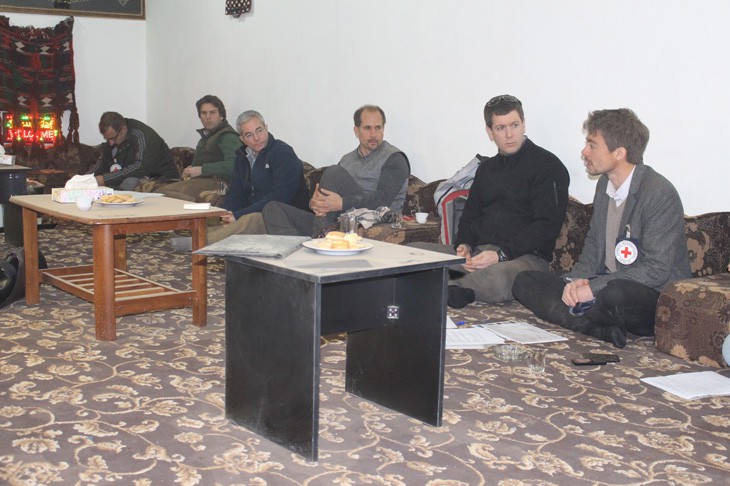
ICRC sub-delegation, Ruweyshid, Jordan. The head of the Ruweyshid sub-delegation briefs the CSG members on the situation and the ICRC's work in the area.
They encountered extreme weather conditions, including a major sandstorm near the Iraqi border and a snow storm when they returned to Amman. More importantly, this part of the trip was an opportunity to share and connect with the stories, the suffering and the endurance of the Syrian refugees.
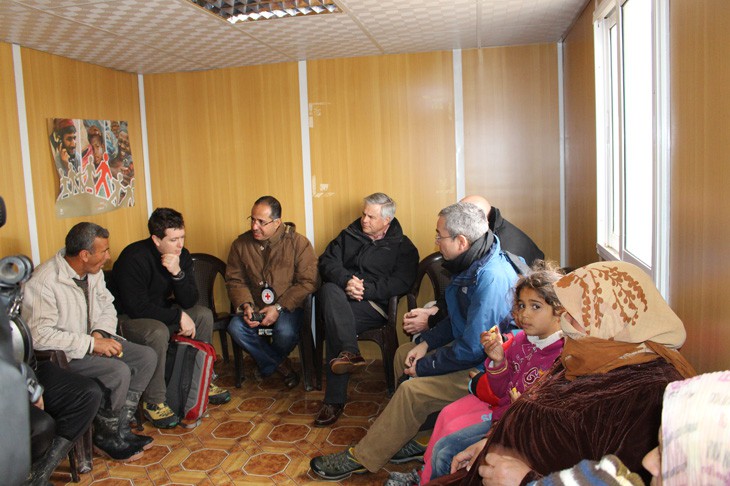
ICRC office, Zaatari refugee camp, Jordan. CSG members talk to Syrian refugees.
Deeper engagement
At the final debriefing with the head and deputy head of the ICRC delegation in Jordan, the participants underlined the high degree of motivation, professionalism and commitment of ICRC staff, the unbearable tragedy of the Syrian refugees and their very uncertain future, the valuable role that Jordan and other neighbouring countries were playing by admitting millions of Syrian refugees and the limited role that the international community was playing in solving the regional crises and mitigating their impact.
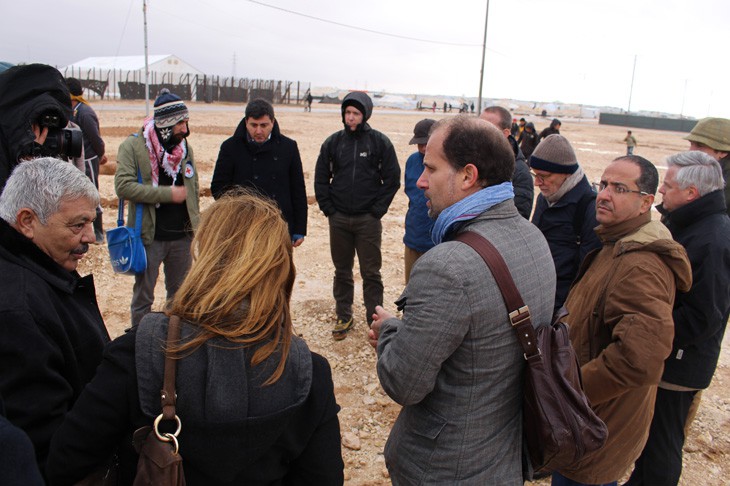
Zaatari refugee camp, Jordan. As they visit the camp, CSG members experience a little of the cold that the refugees face daily.
Interaction between the CSG visitors and ICRC staff during the trip gave both sides glimpses of very different worlds; executive boards and the business world on the one hand and crises and humanitarian action on the other. Everybody gained from the exchanges and the trip was a very positive experience for both the CSG visitors and the ICRC delegation.
The participating companies and foundations were ABB, Avina Stiftung, the Fondation Lombard Odier, Holcim, Novartis and Swiss Re. Nationale Suisse, although not a member of the CSG, also joined the trip.
As Thomas Wellauer, Swiss Re's Chief Operating Officer, put it after his return to Switzerland:
This trip has not only deepened my understanding of the ICRC's work but also increased my high esteem for this great organization even more.
Read more about our work in Syria and Jordan

